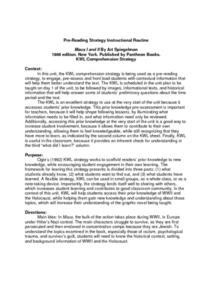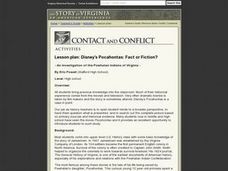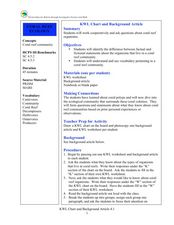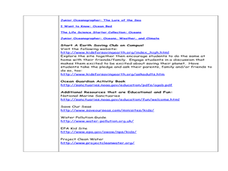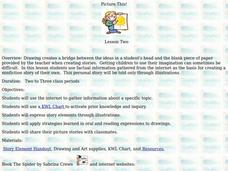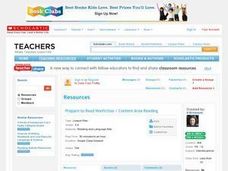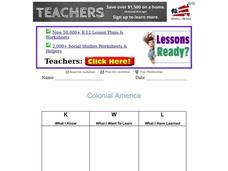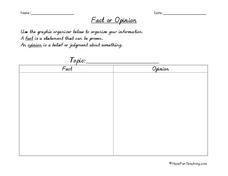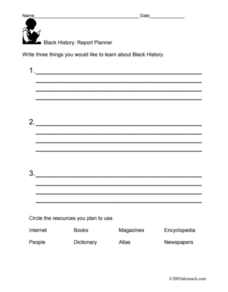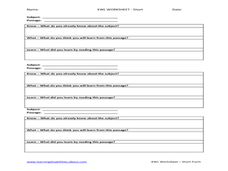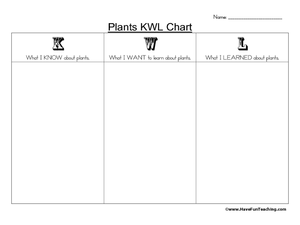Curated OER
The Water Cycle (Evaporation, Condensation, Precipitation)
The 3 steps of the water cycle, evaporation, condensation, and precipitation, are the focus of this lesson. After a neat demonstration of rain using hot water, a pie tin, and ice cubes, young scientists observe and discuss the elements...
Curated OER
KWL Comprehension Strategy: Maus I and II
How much does your class know about World War II? Before reading Art Spiegelman's Maus I, lead your class in creating a KWL chart. Knowing the background and setting of the novel are extremely important in understanding this survivor's...
Curated OER
Disney's Pocahontas: Fact or Fiction?
Did you know that Pocahontas was 12 when Jamestown was established? Did you know that she later married John Rolfe? Did you know that she lived in London for two years? Did you know that she died of small pox? Class members study the...
Curated OER
Earth
Use this KWL-inspired booklet to explore the earth. There are four pages: the title page, a page to record what your pupil knows, a page to record what they want to know, and a page to record what they learned.
Curated OER
KWL Chart and Background Article
Students discuss an ecosystem. In this coral reef lesson, students fill in their own KWL chart and contribute ideas to a whole class KWL chart. They read an article as a class to spark ideas for facts they can add to the "K" part of the...
Curated OER
Lesson 1: Identifying Information in Nonfiction
If you are in need of a lesson on identifying information in a non-fiction text, look no further. The class learns how to use a KWL chart to identify explicit information in the book, Frogs by Gail Gibbons. They fill out the KWL chart,...
Curated OER
The Water Cycle
Third graders investigate water formations by conducting an experiment. In this water properties lesson, 3rd graders utilize pie tins, sponges and salt shakers to create an evaporation and saturation experiment. Students collaborate in...
Curated OER
I Can Preserve My Planet
Students explore renewable and nonrenewable resources. In this ocean preservation lesson, students use KWL charts to understand ways the ocean is important to our daily lives. Students create a poster or wirte a letter to someone...
Curated OER
Picture This
Students explore finding facts from the Internet to create a nonfiction story. In this writing activity, students fill out KWL charts and do internet research about the given topic of spiders. Students then create and illustrate their...
Curated OER
Introduction to Sea Horses
Learners identify different types of sea horses. In this sea horse research lesson, students learn associated vocabulary and listen as the teacher reads Elaine Landau's, Sea Horses A True Book. They visit assigned Internet sites to find...
Curated OER
NonFiction Reading
Students explore reading nonfiction. In this nonfiction instructional activity, students practice using KWL charts to organize nonfiction information gained from reading. Students explore unfamiliar words from reading and recognize...
Curated OER
Colonial America
In this KWL chart activity, students explore colonial America. Students fill out the three columns, what I know, what I want to learn, and what I have learned as they study colonial America.
Curated OER
Inuit and Arctic Animals
Students will explore the animals and people living in the Arctic. In this science lesson, students locate Alaska on a globe, discuss its climate and geographical features, and identify common arctic animals. Students complete the first...
Curated OER
KWL Chart
Students use a KWL Chart. In this lesson, students will have a blank KWL, or what do I know, what do I want to learn, and what did I learn chart. Students get to there the other students in their class by filling it out the KWL chart and...
Curated OER
Food Pyramid KWL
In this food pyramid instructional activity, students utilize a KWL chart to track what they already know, want to know and will have learned about the food pyramid. Students share their charts with their classmates.
Curated OER
KWL Chart
In this graphic organizer, students organize information into three columns. The columns include information about what they know, what they want to learn, and what they learned.
Curated OER
Earth: Mini Book/KWL graphic organizer
In this Earth mini book worksheet, 1st graders will fold their paper to make a KWL mini book. Students will then write a sentence or two about what they know, want to know and learned about Earth.
abcteach
Black History: Report Planner
In this Black History Month worksheet, students list three things that they would like to learn about Black History and choose the resources they plan on using to research the answers to their three questions.
Curated OER
The Giving Tree
Fourth graders participate in a shared reading of The Giving Tree. They discuss the relationship between trees and people in the story. Students contribute to a class KWL chart. They create their own KWL chart with at least four things...
Curated OER
KWL Chart
Use this KWL chart with any subject or material that you see fit. The chart contains three columns, but the first is not what you generally see with a KWL chart. Typically the K represents what the learner already knows about the subject...
Curated OER
KWL Worksheet-Short Version
In this KWL worksheet, students complete a graphic organizer, filling it what they already know about a subject, what they think they will learn and what they did learn. Chart is printed 3 per page for copying purposes.
Curated OER
Seasons
First graders create a KWL chart about the four seasons. In this four seasons lesson plan, 1st graders continue the chart by watching videos and drawings.
Curated OER
The Very Busy Spider
Learners read the story The Very Busy Spider and go on a spider hunt, complete a KWL chart, talk about the animals in the book, and more. In this guided reading lesson plan, students take 5 days to read the book.
Curated OER
Plants KWL Chart
In this plants worksheet, students fill out a KWL chart about plants. Students write what they know, what they want to know, and what they learned.



